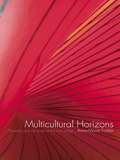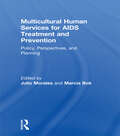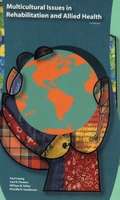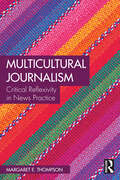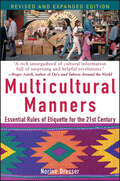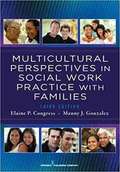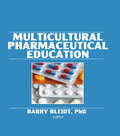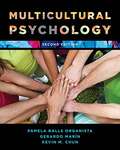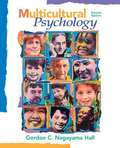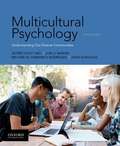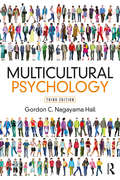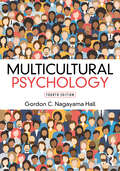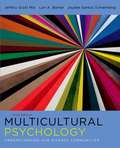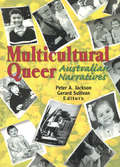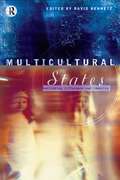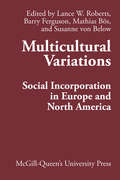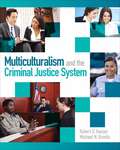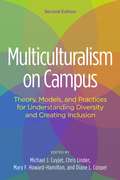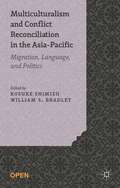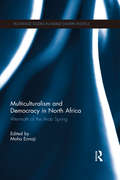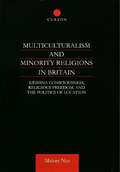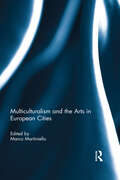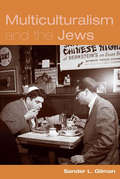- Table View
- List View
Multicultural Horizons: Diversity and the Limits of the Civil Nation (International Library of Sociology)
by Anne-Marie FortierThe intensity of feeling that multiculturalism invariably ignites is considered in this timely analysis of how the ‘New Britain’ of the twenty-first century is variously re-imagined as multicultural. Introducing the concept of ‘multicultural intimacies’, Anne-Marie Fortier offers a new form of critical engagement with the cultural politics of multiculturalism, one that attends to ideals of mixing, loving thy neighbour and feelings for the nation. In the first study of its kind, Fortier considers the anxieties, desires, and issues that form representations of ‘multicultural Britain’ available in the British public domain. She investigates: the significance of gender, sex, generations and kinship, as well as race and ethnicity, in debates about cultural difference the consolidation of religion as a marker of absolute difference ‘moral racism’, the criteria for good citizenship and the limits of civility. This book presents a unique analysis of multiculturalism that draws on insights from critical race studies, feminist and queer studies, postcolonialism and psychoanalysis.
Multicultural Human Services for AIDS Treatment and Prevention: Policy, Perspectives, and Planning
by Marcia Bok Julio MoralesThis much-needed book presents an introduction and overview of multicultural AIDS issues in social work practice. In a culturally diverse nation, it is essential that professionals look at AIDS within a cultural context in order to find the most effective treatment and prevention strategies for everyone. Emphasizing this need for a culturally sensitive approach, Multicultural Human Services for AIDS Treatment and Prevention increases social workers’often limited knowledge and experience with various social and ethnic groups. It provides specific suggestions and recommendations for program development and acts as a foundation upon which to build new strategies for policy, research, and practice. Multicultural Human Services for AIDS Treatment and Prevention emphasizes the importance of encouraging and sharing research that addresses AIDS and minority populations and assessing prevention, education, and behavioral change strategies from culturally specific and relevant perspectives. It includes chapters focusing on African Americans, Native American Indians, Hawaiians, Puerto Ricans, and Mexican prostitutes--groups that often suffer disproportionately from poverty and its myriad effects. Some topics discussed in the book are: helping clients reduce cultural dissonance how to enhance behavior change child welfare and permanency planning empowerment of clients and health care models knowledge, attitudes, and behaviors regarding HIV/AIDS cultural contradictions and ambivalence in response to AIDSMulticultural Human Services for AIDS Treatment and Prevention is an extremely useful and informative book for all professionals in social work and human services who want to be better prepared to help all groups of people. The book is also an ideal text for upper-level social work students studying topics such as multicultural issues in social work practice, AIDS in a cultural context, and health policy and health care systems.
Multicultural Issues In Rehabilitation And Allied Health
by Paul Leung Carl R. Flowers William B. Talley Priscilla R. SandersonThis book addresses the multicultural issues as they impact the fields of rehabilitation and allied health.
Multicultural Journalism: Critical Reflexivity in News Practice
by Margaret E. ThompsonThis book introduces a more collaborative and reflexive way of producing news that incorporates concepts of cultural identity and cultural positioning of both journalists and sources using a feminist approach to inclusion of all voices and perspectives. This text proposes a feminist collaborative model of journalism that incorporates critical reflexivity, requiring journalists not only to be aware of their own cultural positionality but also that of their sources, as a means of producing more authentic and balanced news coverage. The model is intended for use by journalists as well as journalism education programs to educate future journalists on how to effectively serve audiences with scrupulously investigated, reported, and crafted stories. Chapters explore journalism during the Obama and Trump years, current journalistic trends, and alternative media, and feature topics such as fake news, racism, sexism in news production and content, and immigration and media. Thompson addresses issues of power and privilege amongst journalists and marginalized groups, and how these implicate power dynamics of journalism practice and reinforce social inequality, particularly relating to race and gender. This book is ideal for advanced undergraduate and graduate students of journalism and media studies, as well as scholars, journalists, and media practitioners.
Multicultural Manners: Essential Rules of Etiquette for the 21st Century
by Norine Dresser&“A rich smorgasbord of cultural information full of surprising and helpful revelations&” (Roger Axtell, author of Do&’s and Taboos Around the World). Your friend&’s mother-in-law is visiting from Korea. When greeting her, do you bow, shake hands, or kiss her on both cheeks? The meeting with his international customers is going well for the corporate president—until he gives the thumbs-up sign. Why? You welcome your new neighbors with a bouquet of your prizewinning daffodils. Yet your beautiful yellow blossoms are met with looks of shock and horror. Why? Discover the answers in this incisive, award-winning guide to etiquette, now thoroughly revised to reflect today&’s truly multicultural society. Both highly informative and entertaining, Multicultural Manners gives you the understanding you need, the perfect words to say, and the correct behavior to use in a wide range of cross-cultural situations. The book features completely updated etiquette guidelines with special emphasis on post–September 11 culture clashes as well as a brand-new section that demystifies unfamiliar cultures in the news. Norine Dresser identifies key cross-cultural hot spots and suggests methods that foster respect for diversity. You&’ll discover: The dos and don&’ts of successful business and social interaction with people from different cultures Appropriate etiquette regarding body language, food, child rearing, clothing, word choices, colors, entertaining, romance, and gift giving Detailed tips on avoiding embarrassment at work, in the classroom, in health care settings, on business trips, at meals, at weddings, at funerals, and on vacations and holidays Amusing firsthand accounts of cultural gaffes that illustrate how miscues happen—and how to avoid them A breakdown of customs, religions, languages, and ethnicities for seventy different countries
Multicultural Perspectives in Social Work Practice with Families
by Elaine CongressMulticultural Perspectives in Social Work Practice with Families is in its third edition and continues to expand the depth and breadth with which culture may be understood and the impact of culture in working with families. Congress, Gonzalez, and their contributors have updated this text to include a focus on evidence-based practice, 10 additional chapters, revision of a valuable assessment tool, and a culturagram. This book clearly is an essential resource for social workers committed to culturally sensitive practice."--Journal of Teaching in Social Work <p><p> Encompassing the most current issues faced by multicultural families across the lifespan and the social workers who serve them, this popular textbook contains ten new chapters and provides content that has been significantly expanded throughout. These new and reconceived chapters offer professors and social work graduate students a broader and more comprehensive take on the key issues that arise when treating families from diverse cultural backgrounds and current, evidence-based models for assessment and treatment.
Multicultural Pharmaceutical Education
by Barry BleidtMulticultural Pharmaceutical Education spotlights methods and theory on how to increase representation of minorities in pharmacy schools and practice settings. Many of the ideas presented in this book are unique, and all provide an opportunity for institutions with few minority students to greatly improve their recruitment and retention efforts geared toward these students. The contributing authors, representing all levels of academia--deans, undergraduate students, vice provosts, executive directors, a National Professor of the Year, and faculty members--have all had experience in some aspect of minority pharmaceutical education. It is through their practical experiences that they offer suggestions and commentary on pharmacy programs of study. Historical accounts or examples of success that could be emulated at other institutions are included. With the help of Multicultural Pharmaceutical Education, colleges and universities and their faculty can forge ahead in attracting and retaining minority students to their pharmacy programs and into the world of pharmacy practice. Structured around four major areas (foundation, commitment, actuation, and conclusion), the authors remove the option of traditional excuses of failure in this important area of education. All those involved in pharmacy education should read this book whether deans, admissions counselors, professors, or students. Multicultural Pharmaceutical Education provides an easy-to-read, practical and theoretical approach to improving the opportunity and quality of education that minority students can achieve in pharmaceutical programs.
Multicultural Psychology
by Gerardo Marin Pamela Balls Organista Kevin M. ChunAppropriate for both undergraduate and graduate courses, Multicultural Psychology, second edition, provides a comprehensive introduction to the field. This research-based and highly applied text aims to increase students’ sensitivity, awareness, and knowledge of ethnicity, race, and culture and their influence on human behavior and adjustment. A diverse and highly respected team of authors effortlessly weaves together theory with the latest research on ethnic and racial minority groups. Engaging boxes throughout the chapters also highlight key concepts and findings and their practical applications. <p><p> New to This Edition: <p> <p>• Expanded discussion on the interactive effects of key social variables on ethnic and racial groups’ attitudes, norms, values, and behaviors. <p>• Additional sections on topics such as ethnic disparities in health care quality and access and psychological approaches to reducing racism. <p>• New coverage of ethnic and racial minority group members who also share other minority statuses (e.g., sexual and gender minorities) and additional coverage of biculturalism and multicultural and multiracial individuals’ identity formation. <p>• Reorganized table of contents to better reflect a developmental learning approach. <p>• Updated content to include recent research in psychology and related fields (e.g., new acculturation models, an ecological model of health behavior, sociocultural issues in sexual identity formation, and other culture-related syndromes). <p>• Revised ancillaries—written by the authors—include an instructor’s manual, test bank, MS PowerPoint slides, and a new open access Companion Website.
Multicultural Psychology
by Gordon C. Nagayama HallThis text introduces student to cultural and minority status issues in psychology, and the role of multicultural issues in mainstream research. It focuses on multiple cultural groups that co-exist in the United States, and the sociopolitical aspects of this co-existence. An emphasis on empirical research findings complements the "real life" relevance of multicultural psychology.
Multicultural Psychology
by Jeffrey Mio Melanie M. Domenech Rodriguez Lori Barker John GonzalezMulticultural Psychology: Understanding Our Diverse Communities
Multicultural Psychology: Third Edition
by Gordon C. Nagayama HallMulticultural Psychology introduces students to the myriad ways in which multicultural issues affect our understanding of, and research in, a wide range of domains including biological, developmental, social, and clinical psychological science. It provides in-depth coverage of the largest groups of color in the United States: African Americans, Latinx Americans, Asian Pacific Americans, and Native Americans. Students will gain an understanding of how race, ethnicity, and culture shape their own behavior, beliefs, interactions, and expectations, and those of the people around them. New to this edition: -New chapters on Clinical Psychology and Racial/Ethnic Identity and Acculturation -Greater focus on study of intersectional identities -Incorporates up-to-date research from a rapidly growing literature -Expanded coverage of qualitative research methods -Information about supplemental blog and video resources -Companion Website where students will find review questions and resource links, and instructors will find PowerPoint slides and discussion questions
Multicultural Psychology: Third Edition
by Gordon C. Nagayama HallThe new edition of this bestselling textbook, Multicultural Psychology, helps students gain an understanding of how race, ethnicity, and culture shape their beliefs and behavior as well as those of people around them. Giving a voice to people underrepresented in psychology and society, this book introduces multicultural research in biological, developmental, social, and clinical psychology. The book reviews histories, gender roles, and LGBTQ intersectionality of African Americans, Latinx Americans, Asian Americans/Native Hawaiians/Pacific Islanders, Native Americans, Americans of Middle Eastern and North African heritage, and Americans with Multiple Racial/Ethnic Heritages to provide in-depth coverage of the largest groups of color in the United States. It provides the perfect balance of careful presentation of psychological concepts, research, and theories, and a sensitive, expertly rendered discussion of their applications to people of color. This book is ideal for a course on Multicultural Psychology and a must read for all psychology students as well as for everyone interested in multiculturalism. It is accompanied by a full, updated set of resources for students and lecturers. Content new to this edition includes: A chapter on Emerging Groups covering Americans of Middle Eastern and North African heritage, and Americans with Multiple Racial/Ethnic Heritages Up-to-date research on a rapidly growing multicultural literature Review of research on cultural responses to COVID-19 Coverage of White privilege and Whiteness Expanded coverage of qualitative research methods Recent neuroscience research on personally relevant interventions Expanded coverage of LGBTQ intersectionality A glossary Updated instructor and student resources, including PowerPoint lecture slides, video resources, and classroom exercises and activities
Multicultural Psychology: Understanding Our Diverse Communities (Third Edition)
by Jeffery Scott Mio Lori A. Barker Jaydee Santos TumambingMulticultural Psychology: Understanding Our Diverse Communities, Third Edition, combines quantitative and qualitative research with anecdotal material to examine an array of multicultural issues and capture the richness of diverse cultures. The text focuses on such compelling topics as differences in worldviews, communication, racial and cultural identity development, racism, and immigration. Other issues covered in the text include gender, sexuality, age, and ability. The authors provide a strong, vivid, and personal voice to the text, richly populating it with anecdotes from themselves, their students, and other contributors, and using them as central points around which to build their case for multicultural issues based on science.
Multicultural Queer: Australian Narratives
by Peter A. JacksonExamining the intersections of race, culture, gender, and sexuality, Multicultural Queer: Australian Narratives explores the lives of non-Anglo homosexuals in Australia and the difficulties they encounter establishing themselves in gay and lesbian communities. Through academic analyses, creative genres, and personal narratives, this book describes how lesbians and gay men of ethnic minorities negotiate their sexuality amidst dual cultural forces. Multicultural Queer will help you learn about and understand the challenges that gay and lesbian ethnic minorities face within a Western culture.Discussing the experiences of individuals who have double or triple minority statuses--as gay people, as members of ethnic minorities, and/or as women--this book investigates racial stereotypes and the Australian gay “ideal.” From Multicultural Queer, you will learn why many gay men of Asian ancestry feel sexually unattractive, develop certain habits to make themselves more acceptable to peers, and how they struggle to make sense of negative social experiences. Multicultural Queer contains research and first-hand accounts that give you insight into current efforts to explain and combat the exclusion of minorities, such as: the relationship between race and sexuality issues related to self-esteem of gay Asian men as determined by their identification with Asian and/or gay communities common cinematic tropes and theoretical discourses used to depict and define Asians as mostly heterosexual or sexually deviant because of their ethnicity how anti-Semitism and racism are reflected in lesbian communities and how they relate to issues of privilege, invisibility, and exclusion dilemmas, concerns, and strategies for integrating multiculturalism and multisexuality in educational institutions to combat homophobiaProviding a background on immigration to Australia, multiculturism policies, and general facts about the country, Multicultural Queer offers you a complete look at the diversity of Australian society. This insight will help you understand the feelings, stereotypes, and attitudes toward ethnic and sexual minorities and how they deal with their sexual and ethnic multiplicity.
Multicultural States: Rethinking Difference and Identity
by David BennettThe idea of the nation is globally in crisis, but multiculturalism has often seemed to name a specifically national debate. Multicultural States challenges the national focus of these debates by investigating theories, policies and practices of cultural pluralism across eight countries with historical links in British colonialism: the USA, Canada, Australia, New Zealand, India, South Africa, Ireland and Britain. This important book combines discussions of the principles of multiculturalism with studies of specific local histories and political conflicts. The contributors discuss: * communalism and colonialism in India* Irish sectarianism and postmodern identity politics* ethnic nationalism in post-apartheid South Africa* British multiculturalism as part of the heritage industry* feminism and Australian republicanism. Contributors: Ien Ang, David Attwell, Homi K. Bhabha, Gargi Bhattacharyya, Abena P. A. Busia, Dipesh Chakrabarty, Terry Eagleton, John Frow, Henry A. Giroux, Ihab Hassan, Smaro Kamboureli, Maria Koundoura, Beryl Langer, Anne Maxwell, Meaghan Morris, Susan Mathieson and Jon Stratton
Multicultural Variations
by Barry Ferguson Lance W. Roberts Mathias BösContrary to mid-twentieth century predictions, ethnic pluralism has increased dramatically in North America and significantly in Europe. Neither the post 9/11 emphasis on international border security nor anti-immigration and anti-multiculturalism movements have affected the fifty year trend of increasing labour mobility and sustained levels of migration. The ethnic pluralism accompanying this powerful trend has fueled academic research and public debate. Contributors report on and develop a conceptualization of ethnic social incorporation and multiculturalism in Canada, the United States, Germany, Greece, Bulgaria and Italy. This group of countries displays a remarkable variety of both ethnic diversity and public policy responses to ethnic social incorporation over the past four decades. It includes two countries (Canada and the United States) built upon very large-scale immigration over the course of more than a century, two countries (Greece and Italy) which until recently were characterized by large-scale emigration but now are grappling with immigration, one country (Bulgaria) that was until the 1990s insulated from extensive migration and faces a demographic slump, and one (Germany) that has experimented with isolating temporary populations but is now addressing the responsibilities of permanent immigration. Multicultural Variations includes national reports describing each of the six countries under investigation and is book-ended by introductory and concluding chapters that present a new understanding of and synthesis on multiculturalism that is distinct from either enthusiastic support or ideological critiques. Contributors include Mathias Bös (Philipps-Universität Marburg; Germany), Antonio Chiesi, (Università degli Studi di Milano, Italy), Jason Edgerton (University of Manitoba, Canada), Barry Ferguson (University of Manitoba, Canada), Nikolai Genov (Freie Universität Berlin, Germany), Louis Hicks (St Mary's College of Maryland, USA), Paul Kingston (University of Virginia, USA), Laura Maratou-Alipranti (National Centre for Social Research, Athens, Greece), Lance W. Roberts (University of Manitoba, Canada), Sonia Stefanizzi (Università degli Studi di Milano-Bicocca, Italy), and Susanne von Below (Johann Wolfgang Goethe- Universität Frankfurt, Germany),
Multicultural Variations: Social Incorporation in Europe and North America (Comparative Charting of Social Change)
by Barry Ferguson Lance W. Roberts Mathias BösContrary to mid-twentieth century predictions, ethnic pluralism has increased dramatically in North America and significantly in Europe. Neither the post 9/11 emphasis on international border security nor anti-immigration and anti-multiculturalism movements have affected the fifty year trend of increasing labour mobility and sustained levels of migration. The ethnic pluralism accompanying this powerful trend has fueled academic research and public debate. Contributors report on and develop a conceptualization of ethnic social incorporation and multiculturalism in Canada, the United States, Germany, Greece, Bulgaria and Italy. This group of countries displays a remarkable variety of both ethnic diversity and public policy responses to ethnic social incorporation over the past four decades. It includes two countries (Canada and the United States) built upon very large-scale immigration over the course of more than a century, two countries (Greece and Italy) which until recently were characterized by large-scale emigration but now are grappling with immigration, one country (Bulgaria) that was until the 1990s insulated from extensive migration and faces a demographic slump, and one (Germany) that has experimented with isolating temporary populations but is now addressing the responsibilities of permanent immigration. Multicultural Variations includes national reports describing each of the six countries under investigation and is book-ended by introductory and concluding chapters that present a new understanding of and synthesis on multiculturalism that is distinct from either enthusiastic support or ideological critiques. Contributors include Mathias Bös (Philipps-Universität Marburg; Germany), Antonio Chiesi, (Università degli Studi di Milano, Italy), Jason Edgerton (University of Manitoba, Canada), Barry Ferguson (University of Manitoba, Canada), Nikolai Genov (Freie Universität Berlin, Germany), Louis Hicks (St Mary's College of Maryland, USA), Paul Kingston (University of Virginia, USA), Laura Maratou-Alipranti (National Centre for Social Research, Athens, Greece), Lance W. Roberts (University of Manitoba, Canada), Sonia Stefanizzi (Università degli Studi di Milano-Bicocca, Italy), and Susanne von Below (Johann Wolfgang Goethe- Universität Frankfurt, Germany),
Multiculturalism And The Criminal Justice System
by Robert D. Hanser Michael D. GomilaMulticulturalism and the Criminal Justice System, 1e, is the contemporary text that addresses diversity and multicultural issues in the policing, judicial, correctional, and juvenile justice segments of the criminal justice system. This text contains numerous visual aids that showcase data that is current and relevant. Unlike the competition, this text is comprehensive in its portrayal of various minority groups, addresses the issues from a systemic view of criminal justice, is practitioner-driven, and is well organized. <P><P> Teaching and Learning Experience <P><P> This book fulfills the need for a thorough and up-to-date text on multicultural issues facing criminal justice practitioners. It provides: <P><P> Comprehensive content: Students will learn about multiculturalism in a manner that has both breadth and depth <P><P> U p-to-date coverage of multi - cultural issues facing criminal justice practitioners : Examines perspectives from the practitioner, offender, and victim vantage point <P><P> Exceptional pedagogical tools and support for flexible approaches to teaching and learning:Encourages students to develop critical thinking skills with numerous examples and exercises, and makes class preparation quick and easy with innovative features for instructors
Multiculturalism On Campus: Theory, Models, and Practices for Understanding Diversity and Creating Inclusion (Second Edition)
by Mary F. Howard-Hamilton Diane L. Cooper Michael J. Cuyjet Chris LinderThe first edition of this book constituted a comprehensive resource for students of higher education, faculty, higher education administrators and student affairs leaders engaging with multiculturalism and diverse populations on college campuses. It was one of the first texts to gather in a single volume the related theories, assessment methods, and environmental and application issues pertinent to the study and practice of multiculturalism, while also offering approaches to enhancing multicultural programming and culturally diverse campus environments.
Multiculturalism Within a Bilingual Framework
by Eve HaqueFrom the time of its inception in Canada, multiculturalism has generated varied reactions, none more starkly than between French and English Canadians. In this groundbreaking new work, Eve Haque examines the Government of Canada's attempt to forge a national policy of unity based on 'multiculturalism within a bilingual framework,' a formulation that emerged out of the Royal Commission on Bilingualism and Biculturalism (1963-70). Uncovering how the policies of bilingualism and multiculturalism are inextricably linked, Haque investigates the ways in which they operate together as part of our contemporary national narrative to favour the language and culture of Canada's two 'founding nations' at the expense of other groups. Haque uses previously overlooked archival material, including transcripts of royal commission hearings, memos, and reports, to reveal the conflicts underlying the emergence of this ostensibly seamless policy. By integrating two important areas of scholarly concern - the evolution and articulation of language rights in Canada, and the history of multiculturalism in the country - Haque provides powerful insight into ongoing asymmetries between Canada's various cultural and linguistic groups.
Multiculturalism and Conflict Reconciliation in the Asia-Pacific: Migration, Language And Politics
by Kosuke Shimizu William S. BradleyMulticulturalism and Conflict Reconciliation in the Asia-Pacific: Migration, Language and Politics
Multiculturalism and Democracy in North Africa: Aftermath of the Arab Spring (Routledge Studies in Middle Eastern Politics)
by Moha EnnajiInvestigating the connections between multiculturalism, minorities, citizenship, and democracy in North Africa, this book argues that multiculturalism in this region– and in the Arab world at large – has reached a significant level in terms of scale and importance. In the rest of the world, there has been a trend – albeit a contested one – toward a greater recognition of minority rights. The Arab world however, particularly North Africa, seems to be an exception to this trend, as Arab states continue to promote highly unitary and homogenizing ideas of nationhood and state unity, whilst discouraging, or even forbidding, minority political mobilization. The central theoretical premise of this book is that North Africa is a multicultural region, where culture is inherently linked to politics, religion, gender, and society, and a place where democracy is gradually taking root despite many political and economic hurdles. Addressing the lacuna in literature on this issue, this book opens new avenues of thought and research on diversity, linking policy based on cultural difference to democratic culture and to social justice. Multiculturalism and Democracy in North Africa will be of use to students and researchers with an interest in Sociology, Cultural Studies, and Political Science more broadly.
Multiculturalism and Minority Religions in Britain: Krishna Consciousness, Religious Freedom and the Politics of Location (Curzon Studies In New Religious Movements Ser.)
by Malory NyeA detailed case study of the International Society for Krishna Consciousness (ISKCON) in Britain. The book studies the particular development of a new religious movement within the context of Britain, and issues relating to minority religions' place within a multicultural but still hegemonically Christian society.
Multiculturalism and the Arts in European Cities
by Marco MartinielloThis book discusses the tension, or even the contradiction, between ethno-cultural segregation and ethno-cultural mixing in the field of the arts. It focuses on the local artistic sphere in the multicultural EU cities of Amsterdam, Antwerp, Brussels, Cologne, Malmö and Vienna. The chapters show a variety of local experiences by exploring in each city discourses, policies and practices in the local artistic field and by addressing one or more of the following questions: How do cities construct diversity discourses and policies? How do migrants and subsequent generations mobilise in the local artistic scene? What type of collective identities and ethnicities are publicly expressed and constructed in the arts? Are immigrant and ethnic artists and productions supported by official cultural institutions? Are local cultural policies becoming multicultural? How do migrant and ethnic artist mobilise in order to change cultural policies? The contributors combine top-down and bottom-up perspectives from a variety of large, mid-size and small European cities to make sense of the links between migrants and ethnic groups and artistic change at the local level. They examine how the city as an artistic space is changed by minority artistic expression and also how local cultural institutions change minority artistic expressions. The chapter authors are drawn from broad variety of disciplines, including anthropology, cultural studies, political science, sociology, urban studies and planning, offering the reader a broad variety of perspectives and insights into this area. This book was originally published as a special issue of Identities: Global Studies in Culture and Power.
Multiculturalism and the Jews
by Sander GilmanIn this powerful and wide-ranging study, Sander Gilman explores the idea of 'the multicultural' in the contemporary world, a question he frames as the question of the relationship between Jews and Muslims. How do Jews define themselves, and how are they in turn defined, within the global struggles of the moment, struggles that turn in large part around a secularized Christian perspective? Gilman uses his subject to unpack a sequence of important issues: what does it mean to be multicultural? Can the experience of diaspora Judaism serve as a useful model for Islam in today's multicultural Europe? What is a multicultural ethnic? Other chapters look at specific figures in Jewish cultural history – Albert Einstein, Franz Kafka, Israel Zangwill, Philip Roth, the hermaphrodite N.O. Body (aka Karl Baer, raised as Martha Baer) – to explore issues within Jewish identity. Throughout, Gilman pays keen attention to the ways in which contemporary literature – Chabon, Ozick, Zadie Smith, Jonathan Safran Foer, Gary Shteyngart – taking the idea of Jewishness and multiculturalism into new arenas.
